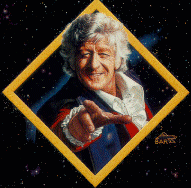The Three Companions: Liz, Jo, Sarah Jane
Body, Soul, and Spirit1. Liz Shaw: Goodness and the Material World
2. Jo Grant: Birth of a Soul
3. Sarah Jane Smith: Witness to the Heavens
4. The Canonical Doctor

The Three Companions: Liz, Jo, Sarah JaneBody, Soul, and Spirit1. Liz Shaw: Goodness and the Material World |
 |
 Liz Shaw: Goodness and the Material World
Liz Shaw: Goodness and the Material World
| Because Liz searches for the "real thing," she is skeptical of the Doctor. Oh, certainly he's brilliant and has traveled in time and space. But there's a lot of twaddle to the Third Doctor, especially early in his regeneration. He boasts and he swaggers, and he bullies, and he gets huffy. All of these things diminish him to Liz. She can be tolerant of him, but she cannot unite to him whole heartedly, because his dishonesty is a roadblock. In Night Terrors, I set up the differences in their respective moralities: |  |
"Is all that you've said about your exile true?"
"Of course it's true." And his voice became slightly indignant. "After all, Liz, I'm not in the habit of telling lies."
Her mouth opened in surprise. "Doctor, you tell lies all the time. You're incorrigible."
He drew himself up. "Only little meaningless lies: like putting up Beware of Radiation Signs when I want to go out for tea. I don't tell great big lies. I don't tell lies about important things."
"But see here: if you're exiled, why were you plopped down on earth?" Again, her eyes enlarged as she considered the reasons. "Did you hurt somebody here? Were you left here for justice to be done to you?"
"Quite the contrary." He reached down to pour himself a cup of tea. "I was exiled here as a sign of clemency towards me, because my superiors know that I've a special affection for earth. I've lent my aid to people on earth several times." He took up his cup. "Surely you know that. You've heard the Brigadier mention the Cybermen."
"Yes." She hesitated. She felt slightly ignorant and untutored, but she spoke her mind. "That's the sort of unearthly stranger I understand. You know, not human at all. But you seem quite human."
"Well I've knocked about on earth quite a bit over the years. Doing what good I can do. Not that my superiors liked my activities---"
"Why not?"
"Oh, they have this ethic that we must not interfere. That we can only observe. They consider my practices intrusive. And besides, I stole my TARDIS out from under their noses."
She was startled. "You stole it?"
"I certainly did. Oh, and I suppose that's going to make me a thief in your eyes."
"Well of course it does!"

| Realistically, I recognize that Liz is a beautiful intellectual who reaches her adulthood during the Sexual Revolution. Most likely, she would be an emancipated woman, which is how I depict her. On the other hand, in keeping with her intensely pure pursuit of that which is the real thing and the real truth, Liz would not be casual in her affairs. And in matters regarding telling the truth and respecting the property of other people, Liz would be downright puritanical. She definitely disapproves of the Doctor's self-centered ethics. And with his bluster added into the mix, Liz remains more of an intellectual associate with him and less of a genuine friend. They have their moments of solidarity and even tenderness, but they are never interdependent on each other. |
 Jo Grant: Birth of a Soul
Jo Grant: Birth of a Soul | People who dislike the Third Doctor era, and Jo Grant in particular, refer to Jo as "stupid." Even Katy Manning has commented that Jo is perfectly ordinary and very often stupid. I was in the target age-group (12) when I first watched Doctor Who, and I always expected Jo to grow with the Doctor. The TV series does show some growth on her part, and I extended this idea in my stories. People grow by what they suffer. So Jo suffers. |  |
| The Doctor has his soul in full possession. He suffers hard, lives large, loves his friends, and enjoys a roaring good time. When Jo first meets him, she's just a giddy little rich kid who wants a job with a lot of thrills. Of course he disdains her at first. But Jo grows on him, and the big change in their relationship occurs when she interposes herself between him and Azal to physically shield him from a deadly energy bolt. Thus, her soul is born. |  |
 Sarah Jane Smith: Witness to the Heavens
Sarah Jane Smith: Witness to the Heavens"Doctor?" a familiar voice called. "Oh! There you are! Are you napping?" The radio was clicked off. Indignant, the Doctor slipped out from under the TARDIS console.
"Sarah Jane, do you mind?" He stood up to meet the small, pert, indignant Sarah Jane.
"Not at all," she said. She fixed her bright eyes on him. Typical of her, she was wearing a tweed blazer over a soft, cowled sweater. She looked very pretty but very business-like. An instant memory of Jo, wearing a reindeer pin that had a flashing nose powered by a battery that was carried in her pocket, raced across his vision for a moment. No, not Sarah Jane. Never.
"Why in the world are you, a rational man, listening to that sentimental nonsense about Christmas?" she demanded. "I mean, it's not like you believe any of it! Don't you find it rather hypocritical?"
He walked past her, out of the TARDIS, and switched on the radio. "I like Christmas music!" he exclaimed. "And I will listen to whatever I choose to listen to, young lady."
"Oh, you're a perfect humbug!" She strode after him. He became thoughtful. Sarah Jane Smith covered up for a lot of things by scolding. Whenever she was acutely afraid, she would run to him just about as quickly as Jo had done, but afterward there was always a scolding in store, as she reinstated herself as his equal. And sometimes if she were nervous about something she would scold to cover for herself.
He had actually come to like it. There was something engaging about her lower lip shooting out and her eyes locking onto his with all that youthful earnestness. She had already proved herself as true as steel in her friendship, and quick witted. She was bright, cheerful, and optimistic about their chances against anything that they should find. And he knew that underneath it all, it was important to her that he like her and respect her. She was not nearly as sure of herself as she wanted to be.
He turned and glanced at her, still thoughtful.
"I mean, it doesn't even stand to reason that you should like Christmas!" she exclaimed, standing and declaiming at the radio, her back to him. In spite of the impressive tweed blazer, she suddenly seemed small and vulnerable. "I mean it's for humans, and it's about humans, and that's all there is to it! And there's better music than this. It's too singsong!"
"That's because it is a song."
She turned and shot an exasperated look at him. "You know what I mean."
Sarah, he also realized, scolded him when what she really wanted was his assurance and sympathy. She was so caught up in this equality notion that sometimes it was difficult for her to lay down her defenses.
| My readers tend to think that Jo Grant is my favorite companion, but Sarah Jane has a lot of charm. For one thing, she's more like the rest of us than either Liz or Jo can be. Not as intellectually astounding as Liz, but far more perceptive and insightful than Jo, Sarah Jane also has a respectable quantity of real life experience. She got where she is by hard work and attention to her craft. The little touches that show her vulnerabilities and desire to be accepted and liked make her all the more delightful. And Sarah Jane shares with us a common characteristic found among Doctor Who fans. She has no parents. |  |
| In that sense, Doctor Who teeters between profane and ridiculous because the series consistently depicts heaven as being more or less like earth. I conceded to this depiction because that's how the canon runs, so I allow that earth-like creatures have taken up squatting rights in heaven's domain. Hence we have Daleks, Cybermen, and the like running around spreading nazi-like ideas about superior races. And I added to the mix with interstellar poker games, casinos, and gumshoe detectives. If anything, I used the backdrop of heaven to show how incredibly seedy our past times are. |  |
| Sarah Jane has the most direct experience of the grace of God, but I depict that she falters before it, afraid of the demands of mercy. She recognizes that she cannot live as heaven's creatures live, for their delight in surrendering themselves up to the goodness that rules them terrifies and burdens her. Her enlightenment, ultimately, is that she needs enlightenment. And though I show that she draws back from it, I also show that her fear is handled compassionately, and a promise is extended to her that mercy will yet find her on her own world. Again, I do not show a conversion, but I show that it might happen. |  |
 The Canonical Doctor The Canonical Doctor
The Doctor as Atheist. To stay consistent with the canon, I depict the Doctor as atheistic (or at least agnostic) from end to end in the stories. He has moments of painful honesty when he realizes that his beliefs cannot account for everything he has seen. At least twice he weeps, with Jo, because it's painful to be an atheist, and there are moments of great humility when he teeters on the verge of enlightenment. I show that the Doctor's atheism is elastic. He can be arrogant, as evidenced when he laughs at Alan in Blood Dimmed Tide for taking communion before attempting a risky task. But he can also be incredibly tenderhearted and repentant, as his tears and frank confession of his wrongs demonstrate in Dangers of Exceeding the Blinovitch Limitation Effect. While showing that he has not changed by the end of his tenure as the Third Doctor, I do show that he may yet change. The Doctor as Enlightener. In spite of having missed the Big Point of the universe, the Doctor remains the man at the Great Doorway. He ushers his companions into the heavens, the domain of God. Therefore, the Doctor is an enlightener. In staying faithful to the series, I retained this aspect of him. But I expanded on it. In that he ushers youthful humans into the heavens, the Doctor is a guide into enlightenment. But the heavens are the actual enlightener. God enlightens. So while travel with the Doctor broadens the mind, God alone reveals truth. The quest for enlightenment (whether or not the companions know they are on a quest for enlightenment) is a pivotal point in several of my stories, and this became problematic for Liz, as Liz never travels with the Doctor into the heavens. But still, the Doctor introduces Liz to the heavens by means of the invaders who come down and by means of the information he imparts to her. Please write and tell me what you think. jeriwho@pipeline.com Back to Jeri's Dr. Who Non-Fiction page View a list of my stories in the order in which they were written. Back to Jeri's Dr. Who Fiction page Back to Jeri's Main Index page |